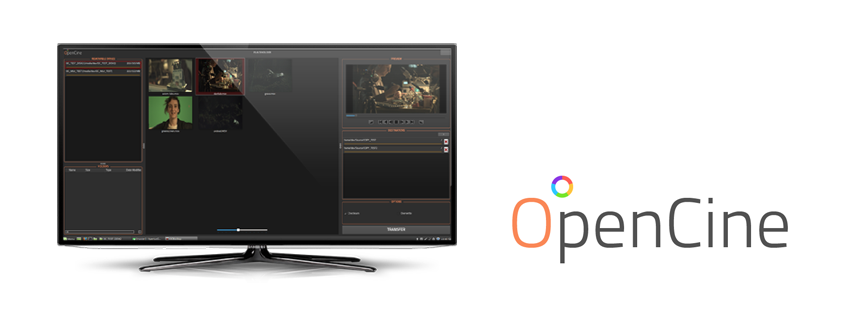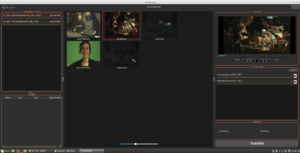Difference between revisions of "OpenCine"
(→Legacy) |
|||
| (28 intermediate revisions by 4 users not shown) | |||
| Line 1: | Line 1: | ||
[[File:OpenCine_With_Screen_Wiki.png]] | |||
OpenCine is a free RAW processing suite in active development. If you'd like to contribute then, together with the below information, it's important to become familiar with three things: | |||
1. [[OpenCine.Build Instructions]] - This details what system requirements, languages and methods are necessary to become involved in the program's development. | |||
2. [https://lab.apertus.org/tag/open_cine/ Labs Workboard] - All outstanding tasks and discussions can be found listed here. | |||
3. [https://github.com/apertus-open-source-cinema GitHub] repositories. | |||
Additional - It may be useful to communicate with other devs in IRC. Links, channel and host details can be found under [[Join the Team]] | |||
<br> | |||
<br> | |||
| Line 5: | Line 17: | ||
There are several free and open raw-image processing tools for still images like: ufraw, darktable, RawTherapee, Rawstudio, digiKam and many more. While some of them offer batch processing capabilities none of these tools were designed for moving pictures. Processing DNG sequences is cumbersome and time consuming, CinemaDNG MXF files are not yet supported at all. This is where Open Cine should come in. It will be a raw processing tool designed from the ground up for moving images instead of still images. | There are several free and open raw-image processing tools for still images like: ufraw, darktable, RawTherapee, Rawstudio, digiKam and many more. While some of them offer batch processing capabilities none of these tools were designed for moving pictures. Processing DNG sequences is cumbersome and time consuming, CinemaDNG MXF files are not yet supported at all. This is where Open Cine should come in. It will be a raw processing tool designed from the ground up for moving images instead of still images. | ||
* Import Footage from Camera over network (FTP Transfer to backup location) | * Import Footage from Camera over network (FTP Transfer to backup location) | ||
| Line 20: | Line 31: | ||
* Batch Export RAW footage between IN/OUT to destructive digital intermediate format (Quicktime Prores444, AVI DNxHD, Image Sequence, etc.) | * Batch Export RAW footage between IN/OUT to destructive digital intermediate format (Quicktime Prores444, AVI DNxHD, Image Sequence, etc.) | ||
* Batch Export RAW footage between IN/OUT to destructive proxy format (Quicktime Prores422 (proxy), Quicktime/AVI MJPEG, etc.) | * Batch Export RAW footage between IN/OUT to destructive proxy format (Quicktime Prores422 (proxy), Quicktime/AVI MJPEG, etc.) | ||
<br> | |||
==Typical Usage== | ==Typical Usage== | ||
| Line 44: | Line 57: | ||
* Apply color grading nodes to the raw footage (White-balance, Exposure correction, Tonal Curves, etc.) | * Apply color grading nodes to the raw footage (White-balance, Exposure correction, Tonal Curves, etc.) | ||
* Export required clips as *.DPX or *.EXR image sequence (with full bitdepth) for finishing suite | * Export required clips as *.DPX or *.EXR image sequence (with full bitdepth) for finishing suite | ||
<br> | |||
==Build Instructions== | |||
{{#ev:youtube|Rpq_ItPHFx8| 1180 | center}} | |||
Full instructions can be found [https://wiki.apertus.org/index.php/OpenCine.Build_Instructions here]. | |||
==Code Documentation== | |||
If you wish to contribute to the project, you can find the Code Documentation [https://wiki.apertus.org/index.php/OpenCine.Code_Documentation here]. | |||
==Demo== | |||
===Screenshots=== | |||
[[File:OCBackup.png|frameless|border|300px|OCBackup]] | |||
| Line 61: | Line 93: | ||
[[OpenCine.Notes]] | [[OpenCine.Notes]] | ||
===Useful Links=== | ===Useful Links=== | ||
| Line 74: | Line 107: | ||
DNG Test Footage: http://neumannfilms.mediafire.com/?o8ea1dxfrj9fwj9 | DNG Test Footage: http://neumannfilms.mediafire.com/?o8ea1dxfrj9fwj9 | ||
==Internal== | ===Internal=== | ||
http://www.colorcombos.com/ | http://www.colorcombos.com/ | ||
[[OpenCine.Features]] | [[OpenCine.Features]] | ||
---- | |||
[[category: OpenCine]] | |||
[[category: raw Processing]] | |||
[[category: Image Processing]] | |||
[[category: DNG]] | |||
Latest revision as of 06:48, 19 May 2019
OpenCine is a free RAW processing suite in active development. If you'd like to contribute then, together with the below information, it's important to become familiar with three things:
1. OpenCine.Build Instructions - This details what system requirements, languages and methods are necessary to become involved in the program's development.
2. Labs Workboard - All outstanding tasks and discussions can be found listed here.
3. GitHub repositories.
Additional - It may be useful to communicate with other devs in IRC. Links, channel and host details can be found under Join the Team
1 Feature Overview
There are several free and open raw-image processing tools for still images like: ufraw, darktable, RawTherapee, Rawstudio, digiKam and many more. While some of them offer batch processing capabilities none of these tools were designed for moving pictures. Processing DNG sequences is cumbersome and time consuming, CinemaDNG MXF files are not yet supported at all. This is where Open Cine should come in. It will be a raw processing tool designed from the ground up for moving images instead of still images.
- Import Footage from Camera over network (FTP Transfer to backup location)
- Import Footage from local drive
- Preview Footage in real-time (GPU based raw debayering at full/reduced resolution [Reduced resolution equates to better playback performance])
- View(all) / Edit(some) Metadata
- Set IN/OUT points in footage
- Apply color relevant RAW transformations (Whitebalance, Exposure, Curves, etc.)
- Save/Load color transformation presets to/from File.
- Adjustments are preserved in a XMP file that stays with the original unaltered footage.
- Compare Color transformations (Presets A,B,C; split screen, etc.) of the same clip or of different clips
- Live Histogram/Vectorscope
- Batch Export RAW footage between IN/OUT to non destructive RAW conforming format (DNG, DPX, etc.)
- Batch Export RAW footage between IN/OUT to destructive digital intermediate format (Quicktime Prores444, AVI DNxHD, Image Sequence, etc.)
- Batch Export RAW footage between IN/OUT to destructive proxy format (Quicktime Prores422 (proxy), Quicktime/AVI MJPEG, etc.)
2 Typical Usage
Reviewing and Sorting Footage
- Import DNG sequence that was shot with a raw camera (Apertus or other) into Open Cine
- View footage in real-time
- mark unneeded clips, rate good clips, write comments for each clip
- later a filter can be used to hide all the bad/unneeded clips. Director could now review only the good ones and continue working with them.
Prepare Footage for Editing
- Import DNG sequence that was shot with a raw camera (Apertus or other) into Open Cine
- Sort through footage and select best clips (rating, marking), shorten to relevant parts in the clips by setting IN/OUT points
- Apply color grading nodes to the raw footage (White-balance, Exposure correction, Tonal Curves, etc.)
- Export Intermediate Clips in FullHD as Avid DNxHD or Apple ProRes for editing in another software
Prepare Footage for Finishing
- An EDL/XML file of a complete edit contains the list of clips we need for finishing, import EDL/XML and link the clips to the raw footage (big win if we find a way to do this automatically)
- Apply color grading nodes to the raw footage (White-balance, Exposure correction, Tonal Curves, etc.)
- Export required clips as *.DPX or *.EXR image sequence (with full bitdepth) for finishing suite
3 Build Instructions
Full instructions can be found here.
4 Code Documentation
If you wish to contribute to the project, you can find the Code Documentation here.
5 Demo
5.1 Screenshots
5.2 Legacy
(Possibly not current)
5.3 Useful Links
http://wolfcrow.com/blog/the-advantages-of-working-in-32-bit-float/
http://www.is.uni-due.de/fileadmin/literatur/publikation/herwig11spie.pdf
http://users.soe.ucsc.edu/~rcsumner/rawguide/RAWguide.pdf
http://www.siliconimaging.com/DigitalCinema/Files/CameraRawWorkflows.pdf
DNG Test Footage: http://neumannfilms.mediafire.com/?o8ea1dxfrj9fwj9
5.4 Internal

